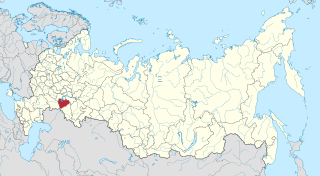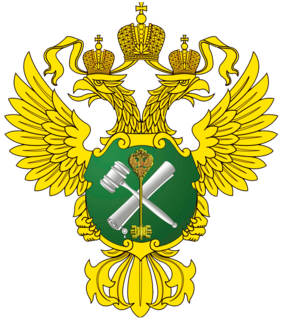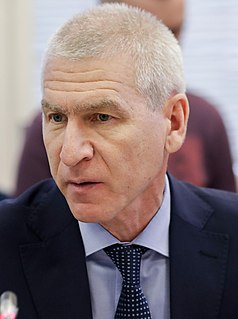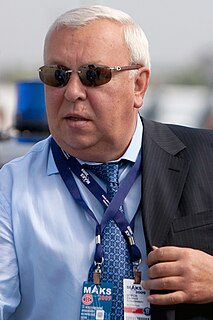
Samara Oblast is a federal subject of Russia. Its administrative center is the city of Samara. From 1935 to 1991, it was known as Kuybyshev Oblast. As of the 2010 Census, the population of the oblast was 3,215,532.

Igor Yevgenyevich Levitin is a Russian political figure, Aide to the President of the Russian Federation since September 2013, and Class 1 Active State Advisor of the Russian Federation (2013). He previously served as the Minister of Transport of the Russian Federation. He is the Chairman of Supervisory Board of the Table Tennis Federation of Russia. He is also a member of the President Advisory Council at the International Table Tennis Federation (ITTF) and president of European Table Tennis Union until March 2022 when he stepped down temporarily due to the 2022 Russian invasion of Ukraine.

The Border Service of the Federal Security Service of the Russian Federation is a branch of Federal Security Service of Russia tasked with patrol of the Russian border.

The Ministry of Defence of the Russian Federation is the governing body of the Russian Armed Forces.

The Ministry of Education of the Union of Soviet Socialist Republics (USSR), formed on 3 August 1966, was one of the most important government offices in the Soviet Union. It was known as the People's Commissariat for Education, or Narkompros, until 1946. Narkompros was a Soviet agency founded by the State Commission on Education and charged with the administration of public education and most of other issues related to culture.

The Federal Agency for State Property Management (Rosimushchestvo) is a subdivision of the Russian Ministry of Economic Development that manages Russia's federal state property.

The structure of Government of the Russian Federation from the time the state formed in 1991 underwent several major changes. In the first years governing bodies, primarily different Ministries, were under massive reorganizations in order to adopt the older Soviet governing networks to the new form of state. Many reshufflings and renamings were made.

Alexander Germanovich Burutin is a Lieutenant General of the Russian Armed Forces. Used to be Adviser to the President of Russia in 2003-2007 and First Deputy Chief of the General Staff of the Armed Forces of the Russian Federation until late 2010.

Dmitry Medvedev's First Cabinet was a cabinet of the government of the Russian Federation following the 2012 Russian presidential election that resulted in the election of Vladimir Putin as the fourth President of Russia.

The Ministry of Sports of the Russian Federation, often abbreviated as Minsport (Минспорт), is a ministry of the Government of Russia responsible for sports.

Oleg Vasilyevich Matytsin is a Russian professor and doctor of Pedagogical Sciences, Corresponding Member of Russian Academy of Education and Honoured Doctor of Beijing Sport University. He is currently Minister of Sport of Russia since 2020 and President of the International University Sports Federation (FISU) since 2015. He is also a member of the Presidential Council of the Russian Federation for the Development of Physical Culture and Sport, a member of the International Fair Play Committee and Honorary President of the Russian Students Sport Union (RSSU). Prior to becoming President of FISU, Matytsin played a crucial role in the development of the European University Sports Federation (EUSA), serving as Vice-President from 2007 to 2015.

The Federal Agency for Maritime and River Transport (Rosmorrechflot), native name: Федеральное агентство морского и речного транспорта is a federal executive body in Russian Federation. It is entrusted to manage state property, maintain transport security-related tasks and provide services in the field of maritime and inland waterway transport. It is under the jurisdiction of the Ministry of Transport of the Russian Federation.

Alexander Viktorovich Grushko is a Russian diplomat, and is currently Deputy Minister of Foreign Affairs, since 22 January 2018. Previously, he was the Permanent Representative of Russia to NATO, serving from 2012 to 2018.
State of emergency in Russia is a special legal regime that is introduced in the country or its individual regions to protect against an internal threat. The state of emergency involves restricting the rights and freedoms of citizens and legal entities, as well as imposing additional duties on them. In this case, the state of emergency, which is introduced in the case of violent unrest or clash, coup attempt, natural disaster or man-made disaster, should be distinguished from the martial law regime that is introduced in the event of external aggression.

Roman Vladimirovich Starovoyt is a Russian politician. He served as deputy Minister of Transport of the Russian Federation and head of the Federal Road Agency in that ministry, and since 2019 he is the Governor of Kursk Oblast. He is member of United Russia party.

Andrey Vladimirovich Chibis, is a Russian statesman and politician. He is currently the 5th Governor of Murmansk Oblast, since 27 September 2019. He was the acting governor of Murmansk Oblast in 21 March 2019 before officially sworn into office. He is the Secretary of the Murmansk regional branch of the United Russia party since 15 November 2019.

Sergey Alimovich Melikov, is a Russian statesman and military leader, who has served as the 5th Head of the Republic of Dagestan since 14 October 2021.

Yevgeny Alekseyevich Murov, is a Russian politician and government agent who had served as the leader of the Russian special services, and director of the Federal Protective Service of Russia from 2000 to 2016. He is a General of the Army as of 12 June 2004.

Artur Alekseyevich Muravyov, is a Russian statesman and politician, who is currently the 5th Plenipotentiary Representative of the president of Russia in the Federation Council since 29 October 2013.

Viktor Fyodorovich Basargin, is a Russian statesman, who is currently the head of the Federal Service for Supervision in the Sphere of Transport (Rostransnadzor) - Chief State Transport Inspector of the Russian Federation since 10 February 2017.





















